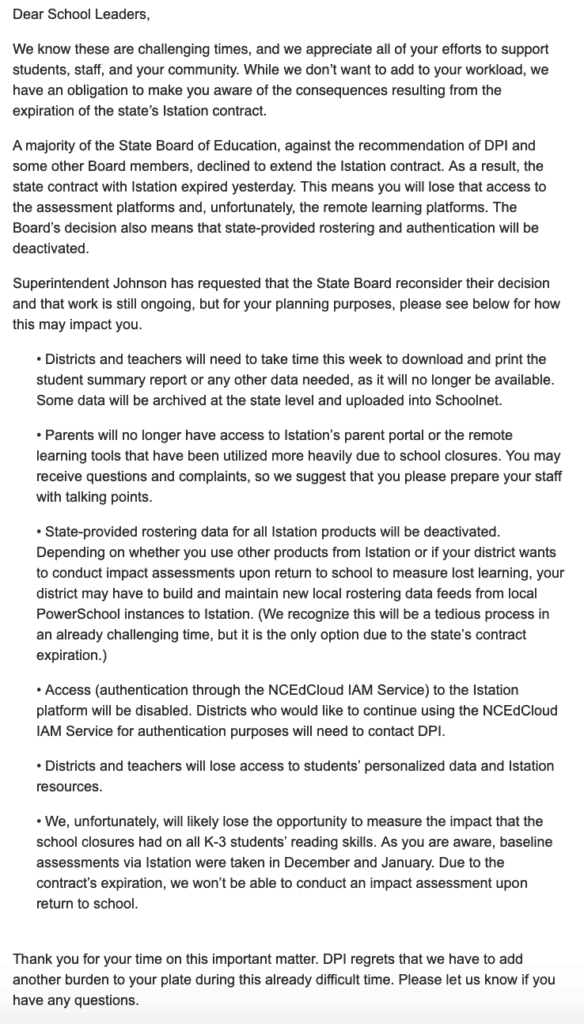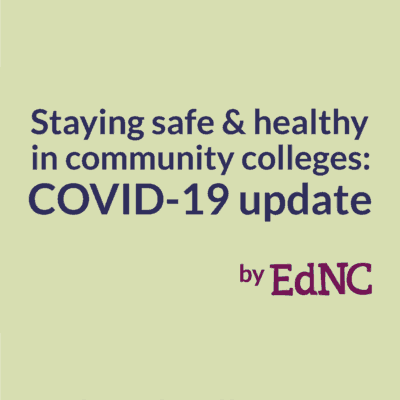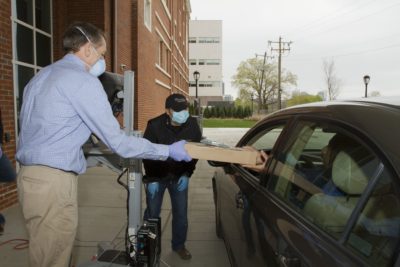

Both the State Board of Education and the education working group of the House select committee on COVID-19 met virtually yesterday, giving further information on the impact of the pandemic, among other things. Peter Hans, president of the North Carolina Community College System, addressed the House select committee.
State Board of Education
At the State Board meeting — the first regularly scheduled meeting since schools closed for in-person instruction — Chair Eric Davis reiterated his hope that schools would open again for in-person instruction this school year.
“While we remain hopeful for a return to in-school instruction … we’ve taken swift action to ensure that the needs of our seniors are immediately addressed, as well as the needs of all students,” he said.
That is a reference to guidelines for grading for seniors as well as the rest of the K-12 student body laid out by the State Board last week.
Beverly Emory, deputy superintendent for the state Department of Public Instruction (DPI), laid out some updates on how the state is dealing with COVID-19, including statistics on child nutrition.
According to her, recent data shows that school districts across the state have 1,131 child nutrition sites up and running. As of yesterday, districts had served 342,678 breakfast meals, 356,571 lunch meals, 4,650 dinner meals, and 10,342 snacks. She gave the update on child nutrition towards the end of her report.
“I left this to the end of my report because our ability to support those people on the front lines to me is the most urgent need right now,” she said.
The State Board also heard a presentation on DPI’s COVID-19 accountability working group, which has identified a number of State Board policies that may warrant review and requests for waivers from the General Assembly.
Past actions
Last week, the Board also voted to table an extension of a short-term contract with Istation, the reading diagnostic tool used in elementary schools in the state. The state has a contract with Istation that expires at the end of March, and the new contract would be $1.2 million to extend the contract until July.
The contract is being tabled while the state is seeking a number of waivers from the General Assembly. Istation was contracted with to fulfill Read to Achieve requirements for formative reading assessments. If those obligations are waived, it may not be necessary to use Istation this year for those purposes. The State Board plans on taking up the contract again after getting guidance from the General Assembly.
State Lt. Gov. Dan Forest released the following statement this week in opposition to that decision.
“The decision made by the State Board of Education last week was not in the best interest of our students. At a time when we should be doing everything we can to provide stability and continuity in the distance learning plans for students in our state, this action does not.
“This decision sends mixed signals to parents, teachers and school districts on what our expectations should be for our students. When we have a Board of Education advocating for waivers from the General Assembly to eliminate benchmark diagnostics, it makes it seem as though learning at home is not necessary when students are out of school. I, for one, will not advocate for blanket waivers for our students. I am very interested to see how students learn and progress during distance learning, but you cannot gather a true understanding of how students grew (or didn’t) by eliminating diagnostic tools during this COVID-19 statewide school closure. Diagnostic tools, like Istation, show parents and teachers how much a student has grown in a subject by continually tracking the student’s progress, rather than administering a standardized EOG test.
“Finally, the guidance in the State Board’s own document for distance learning stated that ‘When remote learning occurs in grades K-5, LEAs/Charters will provide meaningful feedback to promote student growth.’ By not continuing the contract, the SBE decided to not proceed with the only statewide resource/tool for systematically measuring the reading progress of all 461,441 students, kindergarten through 3rd grade.
“During these uncertain times, it is more important than ever for the State Board of Education to provide certainty for parents, teachers and school districts. I had hoped the Board’s decision of discontinuing the state’s system to track the reading achievement of K-3 students would be reversed after significant conversations over the last several days among DPI staff, educators from across the state, and board members. However, it now seems that the original decision will most likely stand.
“Still, I remain hopeful a positive outcome can emerge for our students.”
In addition, an email went out to school leaders from DPI yesterday with instructions on what schools should do now that access to Istation has been cut off.
“A majority of the State Board of Education, against the recommendation of DPI and some other Board members, declined to extend the Istation contract. As a result, the state contract with Istation expired yesterday. This means you will lose that access to the assessment platforms and, unfortunately, the remote learning platforms. The Board’s decision also means that state-provided rostering and authentication will be deactivated.
“Superintendent Johnson has requested that the State Board reconsider their decision and that work is still ongoing,” the email states.
Here is the full email content:


House select committee hears updates on community colleges
Lawmakers in the education working group of the House select committee on COVID-19 heard from Peter Hans, president of the North Carolina Community College System, on how community colleges around the state are dealing with the chaos caused by COVID-19.
He told House members that online instruction is now the norm for most community college classes, though in-person training continues for those in public health and public safety programs. This is only being done by faculty and student agreement and following CDC guidelines.
“We prepare thousands of nurses every year, and thousands of first responders every year,” Hans said. “We felt like this pipeline is needed now more than ever.”
The community college system also created a website for resources for students and faculty.
Hans said community colleges are facing challenges due to classes that were suspended and can’t be taught online. There are also issues with student access to both technology and the internet, particularly in rural parts of the state.
“It’s been pretty bumpy,” he said, pointing out that the “can-do” spirit of community colleges has come up with innovative solutions like setting up drive-through Wi-Fi hot spots at colleges.
The COVID-19 crisis also calls into question what will happen with tuition collected for the 2019-20 school year.
Hans said that between these last few months of the school year being hampered by COVID-19, and the uncertainty around classes and enrollment over the summer, there is a big question of how much money community colleges will lose in tuition.
Hans told lawmakers the system needs a reserve of up to $25 million to draw down from to meet any shortfall from loss in tuition. He also said community colleges need money to transition classes online immediately.
Hans said that community colleges will face challenges going forward with the uncertainty around when in-person classes will start again, and also in dealing with the need to help train North Carolina’s workforce after the pandemic and resulting unemployment.
He also talked about funding needs for the upcoming short session, which will include recurring enrollment growth funding of $41.5 million. For the first time in years, the community college system saw enrollment growth statewide in 2019. Hans also said further funding for online class demand as well as to re-start in-person instruction will be needed.




